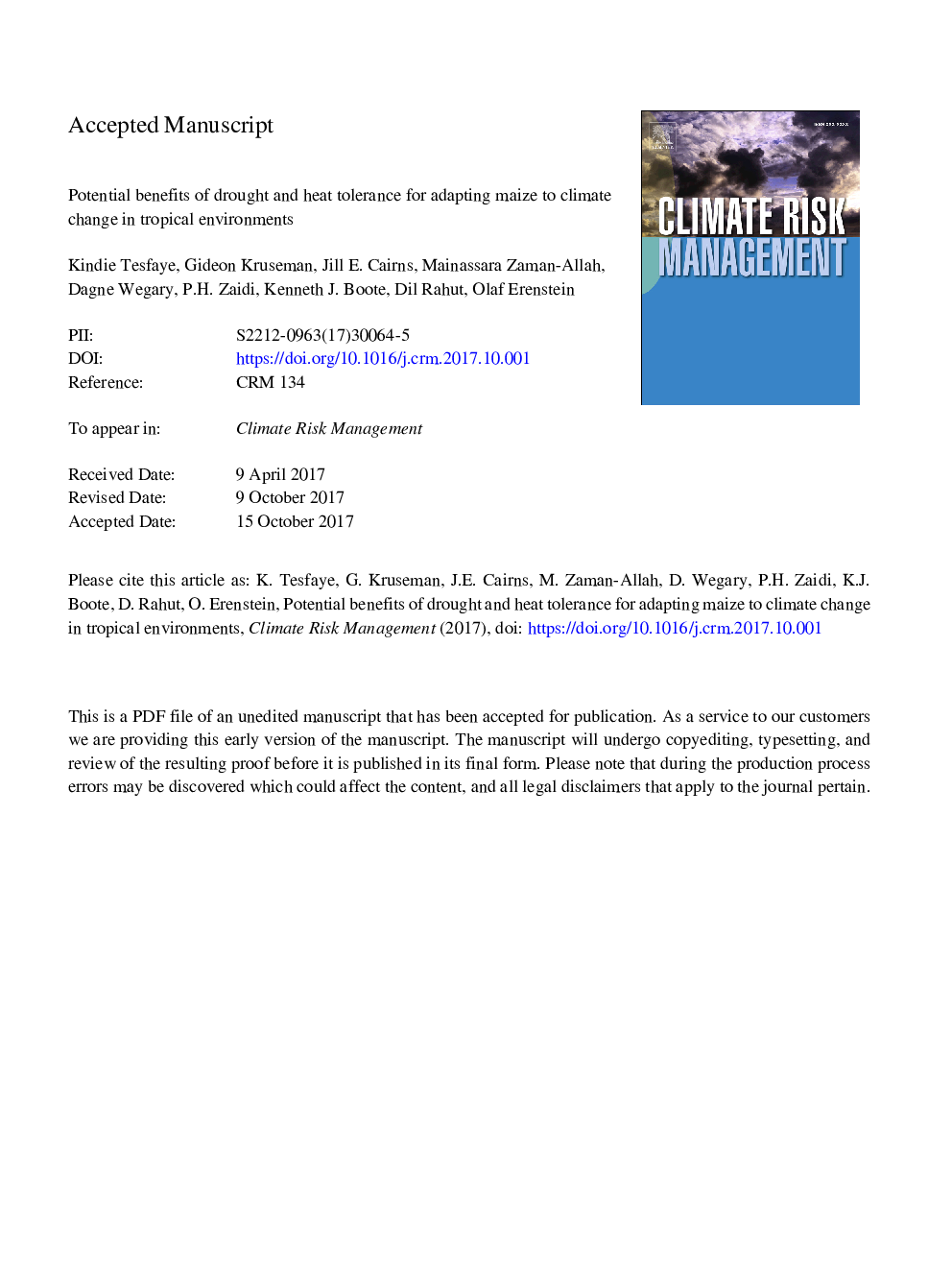| کد مقاله | کد نشریه | سال انتشار | مقاله انگلیسی | نسخه تمام متن |
|---|---|---|---|---|
| 7462092 | 1484873 | 2018 | 36 صفحه PDF | دانلود رایگان |
عنوان انگلیسی مقاله ISI
Potential benefits of drought and heat tolerance for adapting maize to climate change in tropical environments
ترجمه فارسی عنوان
مزایای بالقوه خشکسالی و تحمل گرما برای انطباق ذرت با تغییرات آب و هوایی در محیط های گرمسیری
دانلود مقاله + سفارش ترجمه
دانلود مقاله ISI انگلیسی
رایگان برای ایرانیان
کلمات کلیدی
تغییر آب و هوا، ذرت، تحمل خشکی، تحمل گرما، محیط های گرمسیری،
موضوعات مرتبط
مهندسی و علوم پایه
علوم زمین و سیارات
علم هواشناسی
چکیده انگلیسی
Climate change and population growth pose great challenges to the food security of the millions of people who grow maize in the already fragile agricultural systems in tropical environments. There is an urgent need for maize varieties that are both drought and heat tolerant given the already prevailing drought and heat stress levels in many tropical environments, which are set to exacerbate with climate change. In this study, the crop growth simulation model for maize (CERES-Maize) was used to quantify the impact of climate change on maize and the potential benefits of incorporating drought and heat tolerance into the commonly grown (benchmark) maize varieties at six sites in Eastern and Southern Africa and one site in South Asia. Simulation results indicate that climate change will have a negative impact on maize yield at all the sites studied but the degree of the impact varies with location, level of warming and rainfall changes. Combined hotter and drier climate change scenarios (involving increases in warming with a reduction in rainfall) resulted in greater average simulated maize yield reduction (21, 33 and 50% under 1, 2 and 4â¯Â°C warming, respectively) than hotter only climate change scenarios (11, 21 and 41%, respectively). Incorporating drought, heat and combined drought & heat tolerance into benchmark varieties increased simulated maize yield under both the baseline and future climates. The average simulated benefit from combined drought & heat tolerance was at least twice that of heat or drought tolerance and it increased with the increase in warming levels. The magnitude of the simulated benefits from drought tolerance, heat tolerance and combined drought & heat tolerance and potential acceptability of the varieties by farmers varied across sites and climate scenarios indicating the need for proper targeting of varieties where they fit best and benefit most. It is concluded that incorporating drought and heat tolerance into maize germplasm has the potential to offset predicted yield losses and sustain maize productivity under climate change in vulnerable sites.
ناشر
Database: Elsevier - ScienceDirect (ساینس دایرکت)
Journal: Climate Risk Management - Volume 19, 2018, Pages 106-119
Journal: Climate Risk Management - Volume 19, 2018, Pages 106-119
نویسندگان
Kindie Tesfaye, Gideon Kruseman, Jill E. Cairns, Mainassara Zaman-Allah, Dagne Wegary, P.H. Zaidi, Kenneth J. Boote, Dil Rahut, Olaf Erenstein,
